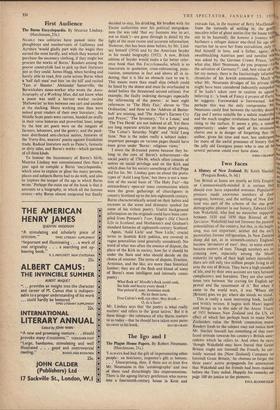Two Faces
A History of New Zealand. By Keith Sinclair (Penguin Books, 3s. 6d.) THE British at home are mostly so little Empire. or Commonwealth-minded it is curious they should ever have expanded overseas. Population pressure made enormous numbers of them emigrate, however, and the settling of New Zen' land was part of the scheme of the one great demographic planner in our history, Edward Gib- bon Wakefield, who had no stauncher supporter between 1830 and 1850 than Rintoul of the Spectator. Wakefield had not foreseen the pastoral potentialities of the country, but this, in the begin' ning, was not important; neither did the early pastoralists foresee refrigeration. In New Zealand sheep did not, as in sixteenth-century England. become 'devourers of men'; they, to some extent, became ousters of men. Though numbers are in- creasing now, especially among the Maori minority (in spite of their high infant mortality), there are still only two million people living in an area the size of Britain. They have a high standard of life, and by their own account are torn between complacency and boredom. They are also some- times torn between 'the craving for English ap- proval and the resentment of it.' But when it came to the world wars, it was 'Where she [Britain] goes we go; where she stands we stand.'
This is really a most interesting book, lucidly and briskly written. It begins with Maori legend and brings us to this side of the Anzus Treaty of 1951 between New Zealand and the US, an effect of which has perhaps been to make New Zealanders value the British connection -more. Readers fresh to the subject may not notice how Mr. Sinclair himself has something of that two- faced attitude towards his country's British ante- cedents which he refers to. And when he says, 'though Wakefield may have feared that Great
Britain might not forestall the French, he cer- tainly wanted the [New Zealand] Company to forestall Great Britain,' he chooses to forget the three years' active propaganda for annexation that Wakefield and his friends had been making, before the Tory sailed, Happily his remarks on page 108 do justice to the pioneers.
PAUL BLOOMFIELD










































 Previous page
Previous page